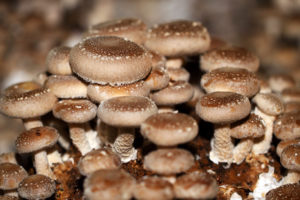Mushrooms are awesome and a fascinating life form!
They belong neither to the plant nor animal kingdoms, and they actually share more DNA with animals that they do with plants. Adding to their strangeness, the largest organism ever discovered on the planet is a network of mushroom mycelium that weaves across a colossal 2,200 acres underneath Oregon’s ancient Malheur National Forest!
Human use of medicinal mushrooms has a long and rich history, and the valuable medicines of mushrooms are important elements in protecting our health. Fungi have developed incredible properties to ward off bacteria and mold that would compete with them. When humans consume these fungi, most of all they are imparted with a strong immunity. This will be an important theme throughout the article and in general, and of vital importance in our day and age. These benefits and many more can be yours when you embrace the mushroom medicine! I did!
A large amount of the world’s population live on a mostly vegetarian diet. Especially in Asia, they consume Mushrooms as a staple food. This could well be the secret to their longevity and success!
One of the misconceptions about mushrooms is that they carry little nutritional value. However this is further from the truth. Apart from being a low calorie highly nutritional food source, mushrooms carry unique compounds such as for example an antioxidant called L-ergothioneine and are choked-full of B vitamins. Also 5 little button mushrooms contain more potassium than an orange!
But the most important here is that mushrooms have been scientifically proved to having anti-bacterial and anti-viral properties which assist the body in fending off diseases like Polio, Hepatitis B, HIV, Influenza, HSV-1 and HSV-2 as well as the small pox virus. There is a number of compounds in fungi that can stimulate immune function and inhibit tumor growth. In particular, compounds called polysaccharides, which are large, complex branched chain-like molecules built from many smaller units of sugar molecules, have been intensively studied since the 1950s. Time and time again they have been shown to have antitumor and immune-stimulating properties, not only from many of the medicinal mushrooms studied, but also from lichens (such as usnea), bacteria, and even from the cell wall of a yeast (called zymosan). Recently, German researchers have demonstrated that immune-activating polysaccharides similar to those found in many fungi are also found in other plants, such as the widely popular Echinacea, and Astragalus (an important Chinese herb).
One of the most important and researched polysaccharide is called beta glucan and it was studied for its effects on the immune system and its anti-tumor properties. An assay to detect the presence of beta-D-glucans in the human blood is marketed as a means of diagnosing invasive fungal infection in patients.
The polysaccharides are not the only immune-modulating compounds found in mushrooms but only the most important one. There is seven primary constituent classes, or “pillars”, that all together add up to the immunity enhancing effects of mushrooms. These are:
- Polysaccharides (ex. Alpha & Beta-glucans): Immunomodulating effects
- Glycoproteins (ex. PSK): Immunomodulating effects
- Triterpenes (Sterols, ex. sistosterols, stigmasterols, campesterols)
- Lipids: Cholesterol modulating effects
- Proteins (Enzymes): Antioxidants properties
- Cyathane derivatives (ex. erinacines & hericenones, nerve growth stimulant factors)
- Secondary Metabolites
Beside the immuno-modulating properties, mushrooms also offer other potentially important health benefits, including liver protection, antioxidants, anti-hypertensive and cholesterol-lowering properties, as well as anti-inflammatory, anti-diabetic, anti-viral and anti-microbial properties. These properties have attracted the interest of many pharmaceutical companies, which are viewing the medicinal mushroom as a rich source of innovative biomedical molecules.
The Chinese and the Egyptians were among the first people to appreciate the value of the mushroom. Egyptians associated mushroom with immortality and since they revered their Pharaohs, they included mushroom as a specialty in the diet of the royal family. Many countries in Asia and Eastern Europe too have been fascinated by the mushroom for centuries. China in particular associated it with longevity, a good immune system and strength.
Others like the Romans, however, went to the other extreme by chastising the mushroom for its poisonous potency since it apparently killed their Emperor Claudius in a premeditated murder.
Today, outside the medicinal use, the mushroom is part of expensive cuisines in luxurious restaurants all over the world. Mushroom is also used as an effective leavening and fermentation agent in food processes.
An in-depth analysis of mushrooms a few decades ago also led to some interesting discoveries. Scientists discovered that some enzymes present in the stipe (the stem of the mushroom) can be used in the manufacture of detergents. On the other hand, toxic elements in some mushroom species that the plant presumably uses to deter predators (including humans), can be used to produce environmentally friendly pesticides.
Mushrooms also seem to have great potential in the field of biotechnology. It is already being used to spur plant growth and or lower the level of bacterial contamination in water. The US Patent and Trademark Office has registered different patents in relation to the specialized fields of myco-remediation, (“myco-“ means fungus) a cleaning process where contaminants are biodegraded to clean the environment and myco-filtration, a filtration process that gets rid of disease causing elements like the bacteria, e.coli and the protozoa plasmodium falciparum.
It is therefore evident from all its various uses, dietary and most importantly medicinal use that the mushroom is the most significant fungus after penicillin.
In the end, I just wanted to introduce here six of the most well-researched anti-cancer mushrooms rich in polysaccharides and beta glucans, the primary active immune-enhancing constituents: Reishi (Ganoderma lucidum) “The Mushroom of Immortality”; Shitake (Lentinula edodes) – Black Forest Tree Mushroom; Coriolus (Trametes versicolor) “Turkey tail Mushroom” ; Cordyceps sinensis – Chinese Caterpillar Fungus; Maitake (Grifola frondosa) – Cloud Mushroom; Chaga (Inonotus obliquus) – Black Tree Fungus.

